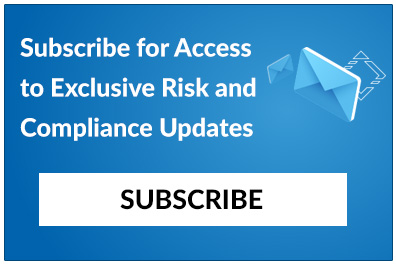Home/ Blog / Automated Compliance Management – Key Reasons and Its Advantages for the Financial Sector
Automated compliance management means utilizing Artificial Intelligence (A.I.) powered systems to eliminate manual administration from compliance activities. When banks, credit unions, FinTechs, insurance companies, mortgage companies, or other financial institutions grow, they must meet increasing compliance requirements.
Automated systems provide these firms the necessary support to ensure their operations remain compliant with rules and regulations. Unfortunately, many of the compliance teams within the financial sector spend too much time on manual and repetitive administration, making compliance overly difficult.
For instance, many organizations use emails and calendar reminders to notify their employees about the deadline and as evidence to support their audits and they store these files on online drives until further scheduled audits.
The manual storage and retrieval system proves challenging to maintain audits, especially for firms with regular compliance audits scheduled. The process creates an environment where employees dedicate their time to audits rather than business activities.

Key Points of an Effective Compliance Management Program
Any successful Regulatory Compliance Management (RCM) or automated compliance program that any firm needs to implement has the following key elements:
Testing: The system needs evaluation before its final implementation.
Procedures and Policies: The policies and procedures to implement that system must remain clear and easily understandable.
Tools: The tools available in the software must take care of all the manual tasks.
Review: The system must make continuous reviews and updates easy to improve processes.
Reasons to Automate Compliance
Although automated regulatory compliance management enables streamlining activities, firms still need compliance teams. RCM does not mitigate the need for a team but makes their work more efficient and productive.
A few key reasons that prompt banks and financial firms to consider automated compliance management include:
Confidence in Compliance
Many banks and firms still utilize legal and financial experts to help interpret their compliance requirements. New legislative obligations have a long list of legal jargon that firms must follow. RCM software clearly defines the regulations an organization needs to follow and keeps them up to date with compliance teams.
RCM adds legislative updates as soon as they appear, which aligns the work of complaint teams with every regulation. Assigning tasks and regular progress updates become available, and the team receives updated content.
Content Updates
Compliance has become complex today due to the introduction of legislation, regulatory changes, and socio-economic conditions. The content is not frequent enough and often exposes organizations to non-compliance risks if waiting for annual or quarterly updates. RCM systems work in collaboration with compliance experts to give real-time updates on content according to specific regulations applied to an organization.
Understanding new compliance regulations becomes accessible once the team efficiently organizes, manages, and tracks all the updates and requirements in one application.
Process Automation
Organizations do not need to spend hours building their activities and reports for presentation as RCM software automates all their processes. With a click of a button, they receive insights, analysis charts, or reports whenever needed. Firms can also schedule their emails and notifications for straight delivery to employees or managers.
Control processes, risk assessments, alerts, notifications, and almost every activity becomes automatic and eliminates redundancy in compliance programs. In short, it helps manage compliance and mitigate manual compliance needs.
Benefits of Implementing Automated Compliance Management
Automated compliance management is beneficial for organizations that deal with sensitive (financial) data and impacts safety, security, cost savings, and reporting. Some key benefits that firms receive include:
Reduction in Compliance Risks
Automating compliance activities enable firms to remain out of any non-compliant action, reducing their chance of sticking to anything through which any compliance risk arises. A significant reduction in human error and time consumption happens as the potential issues become automated.
Automated compliance allows continuous monitoring, identification, and reporting of issues that keep organizations compliant according to regulations.
Real-Time Display
Since automated compliance management systems consolidate needed information into a single dashboard. Organizations do not need to follow manual pathways to store and retrieve data, eliminating time consumption. Compliance teams can also get a real-time display of the organization’s progress across that board and benefit from a robust risk management foundation.
If the organization falls out of compliance, the system immediately alerts for addressing the problem. They mitigate the issue within hours instead of days or weeks.
Efficiency
Manual processes have a chance of human error that can cost an organization in cost and time and sometimes penalties. Even the most skilled team member may miss out on any step necessary for compliance. Automated compliance management systems significantly mitigate manual processes and errors and keep every strategy aligned to regulations and compliance needs.
After the RCM system’s implementation, the human’s role is only to react to the notification and take immediate action.
About Us
360factors, Inc. (Austin, TX) helps companies improve business performance by reducing risk and ensuring compliance. Predict360 is a flagship software product that integrates regulations and requirements, policies and procedures management, risks and controls, audit management, and inspections with online training and qualifications in a single cloud-based platform based on artificial intelligence. Remain up to date on industry news/updates through our Twitter & Linkedin profiles.
Request a Demo
Complete the form below and our business team will be in touch to schedule a product demo.
By clicking ‘SUBMIT’ you agree to our Privacy Policy.




